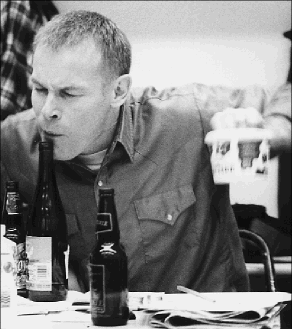
    |
 |
|
by Paul Serralheiro

Too poor to hire a band? Norman Nawrocki shows how to make your own accompaniment by blowing across a bottle and shaking a box of popping corn.
On Sunday afternoon, when the front-page headlines announced the imminent bombing of Iraq and global corporatism inched slowly forward, a group of people -- musicians, writers, a dancer, some journalists, community organizers and activists -- gathered in a small room of the Henry F. Hall Building to listen to Norman Nawrocki.
Nawrocki's creative and activist credentials are impressive: 12 years and international notice as composer, singer and violinist with the Montreal duo Rhythm Activism; publication of two volumes of critically well-received poetry, songs and prose; and involvement in social issues, from his days as a journalist and organizer in Vancouver community groups to his tenacious commitment to contemporary local issues of poverty, welfare rights and social housing. Rhythm Activism's latest CD is titled Jesus was Gay (the title song attacks homophobia).
"I don't write for political people; I write for many people," Nawrocki told the 30 participants at Sunday's Music and Revolution workshop. It was part of the Tools for Change Activist Workshop and Lecture series organized by Concordia's arm of the Quebec Public Interest Research Group (QPIRG), an organization dedicated to social and environmental change.
Nawrocki gave an audio-illustrated talk, which was a quick overview of the history of protest music, from the cave-dwellers bad-mouthing a chieftain and minstrels criticizing the king to a Chilean protest poet who had his tongue cut out to silence him.
"We've relinquished our voices to corporate conglomerates," Nawrocki declared. "It's time to reclaim our voices -- to sing out, to use our voices as a tool for social change. We share a basic love of music, and we've got the political thing. How do we combine these two?"
The question was answered over the next three hours, as Nawrocki led a hands-on composition/arranging/performance exercise. It emphasized speed -- an important element in the life of topical songs. Pressing issues need to be responded to quickly.
Six groups were formed, each with a guitar and an assortment of instruments -- tin whistles, recorder, trumpet, violins, drums and impromptu percussion devices. Given 10 minutes to work in separate rooms on the same set of protest lyrics by Scottish group The Dogfaced Hermans, groups came up with distinct but equally effective results.
"You know what to do. You just have to go out there and involve yourselves," Nawrocki told them. Inspired by the experience, the participants agreed to meet again.
There are more events in this vein, including an "anti-consumerist and anti-poverty Christmas carols" project, and, on November 19, a screening of Beyond McWorld in QPIRG's Activist Videos series. For more information, phone 848-7585 or visit the QPIRG Web site: http://alcor.concordia.ca/~qpirg



